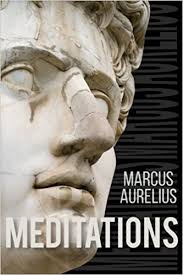Meditations Page #13
Meditations is a series of personal writings by Marcus Aurelius, Roman Emperor from 161 to 180 AD, recording his private notes to himself and ideas on Stoic philosophy. Marcus Aurelius wrote the 12 books of the Meditations in Koine Greek as a source for his own guidance and self-improvement.
III. They seek for themselves private retiring places, as country villages, the sea-shore, mountains; yea thou thyself art wont to long much after such places. But all this thou must know proceeds from simplicity in the highest degree. At what time soever thou wilt, it is in thy power to retire into thyself, and to be at rest, and free from all businesses. A man cannot any whither retire better than to his own soul; he especially who is beforehand provided of such things within, which whensoever he doth withdraw himself to look in, may presently afford unto him perfect ease and tranquillity. By tranquillity I understand a decent orderly disposition and carriage, free from all confusion and tumultuousness. Afford then thyself this retiring continually, and thereby refresh and renew thyself. Let these precepts be brief and fundamental, which as soon as thou dost call them to mind, may suffice thee to purge thy soul throughly, and to send thee away well pleased with those things whatsoever they be, which now again after this short withdrawing of thy soul into herself thou dost return unto. For what is it that thou art offended at? Can it be at the wickedness of men, when thou dost call to mind this conclusion, that all reasonable creatures are made one for another? and that it is part of justice to bear with them? and that it is against their wills that they offend? and how many already, who once likewise prosecuted their enmities, suspected, hated, and fiercely contended, are now long ago stretched out, and reduced unto ashes? It is time for thee to make an end. As for those things which among the common chances of the world happen unto thee as thy particular lot and portion, canst thou be displeased with any of them, when thou dost call that our ordinary dilemma to mind, either a providence, or Democritus his atoms; and with it, whatsoever we brought to prove that the whole world is as it were one city? And as for thy body, what canst thou fear, if thou dost consider that thy mind and understanding, when once it hath recollected itself, and knows its own power, hath in this life and breath (whether it run smoothly and gently, or whether harshly and rudely), no interest at all, but is altogether indifferent: and whatsoever else thou hast heard and assented unto concerning either pain or pleasure? But the care of thine honour and reputation will perchance distract thee? How can that be, if thou dost look back, and consider both how quickly all things that are, are forgotten, and what an immense chaos of eternity was before, and will follow after all things: and the vanity of praise, and the inconstancy and variableness of human judgments and opinions, and the narrowness of the place, wherein it is limited and circumscribed? For the whole earth is but as one point; and of it, this inhabited part of it, is but a very little part; and of this part, how many in number, and what manner of men are they, that will commend thee? What remains then, but that thou often put in practice this kind of retiring of thyself, to this little part of thyself; and above all things, keep thyself from distraction, and intend not anything vehemently, but be free and consider all things, as a man whose proper object is Virtue, as a man whose true nature is to be kind and sociable, as a citizen, as a mortal creature. Among other things, which to consider, and look into thou must use to withdraw thyself, let those two be among the most obvious and at hand. One, that the things or objects themselves reach not unto the soul, but stand without still and quiet, and that it is from the opinion only which is within, that all the tumult and all the trouble doth proceed. The next, that all these things, which now thou seest, shall within a very little while be changed, and be no more: and ever call to mind, how many changes and alterations in the world thou thyself hast already been an eyewitness of in thy time. This world is mere change, and this life, opinion. IV. If to understand and to be reasonable be common unto all men, then is that reason, for which we are termed reasonable, common unto all. If reason is general, then is that reason also, which prescribeth what is to be done and what not, common unto all. If that, then law. If law, then are we fellow-citizens. If so, then are we partners in some one commonweal. If so, then the world is as it were a city. For which other commonweal is it, that all men can be said to be members of? From this common city it is, that understanding, reason, and law is derived unto us, for from whence else? For as that which in me is earthly I have from some common earth; and that which is moist from some other element is imparted; as my breath and life hath its proper fountain; and that likewise which is dry and fiery in me: (for there is nothing which doth not proceed from something; as also there is nothing that can be reduced unto mere nothing:) so also is there some common beginning from whence my understanding hath proceeded. V. As generation is, so also death, a secret of nature's wisdom: a mixture of elements, resolved into the same elements again, a thing surely which no man ought to be ashamed of: in a series of other fatal events and consequences, which a rational creature is subject unto, not improper or incongruous, nor contrary to the natural and proper constitution of man himself. VI. Such and such things, from such and such causes, must of necessity proceed. He that would not have such things to happen, is as he that would have the fig-tree grow without any sap or moisture. In sum, remember this, that within a very little while, both thou and he shall both be dead, and after a little while more, not so much as your names and memories shall be remaining. VII. Let opinion be taken away, and no man will think himself wronged. If no man shall think himself wronged, then is there no more any such thing as wrong. That which makes not man himself the worse, cannot make his life the worse, neither can it hurt him either inwardly or outwardly. It was expedient in nature that it should be so, and therefore necessary. VIII. Whatsoever doth happen in the world, doth happen justly, and so if thou dost well take heed, thou shalt find it. I say not only in right order by a series of inevitable consequences, but according to justice and as it were by way of equal distribution, according to the true worth of everything. Continue then to take notice of it, as thou hast begun, and whatsoever thou dost, do it not without this proviso, that it be a thing of that nature that a good man (as the word good is properly taken) may do it. This observe carefully in every action. IX. Conceit no such things, as he that wrongeth thee conceiveth, or would have thee to conceive, but look into the matter itself, and see what it is in very truth. X. These two rules, thou must have always in a readiness. First, do nothing at all, but what reason proceeding from that regal and supreme part, shall for the good and benefit of men, suggest unto thee. And secondly, if any man that is present shall be able to rectify thee or to turn thee from some erroneous persuasion, that thou be always ready to change thy mind, and this change to proceed, not from any respect of any pleasure or credit thereon depending, but always from some probable apparent ground of justice, or of some public good thereby to be furthered; or from some other such inducement.
Translation
Translate and read this book in other languages:
Select another language:
- - Select -
- 简体中文 (Chinese - Simplified)
- 繁體中文 (Chinese - Traditional)
- Español (Spanish)
- Esperanto (Esperanto)
- 日本語 (Japanese)
- Português (Portuguese)
- Deutsch (German)
- العربية (Arabic)
- Français (French)
- Русский (Russian)
- ಕನ್ನಡ (Kannada)
- 한국어 (Korean)
- עברית (Hebrew)
- Gaeilge (Irish)
- Українська (Ukrainian)
- اردو (Urdu)
- Magyar (Hungarian)
- मानक हिन्दी (Hindi)
- Indonesia (Indonesian)
- Italiano (Italian)
- தமிழ் (Tamil)
- Türkçe (Turkish)
- తెలుగు (Telugu)
- ภาษาไทย (Thai)
- Tiếng Việt (Vietnamese)
- Čeština (Czech)
- Polski (Polish)
- Bahasa Indonesia (Indonesian)
- Românește (Romanian)
- Nederlands (Dutch)
- Ελληνικά (Greek)
- Latinum (Latin)
- Svenska (Swedish)
- Dansk (Danish)
- Suomi (Finnish)
- فارسی (Persian)
- ייִדיש (Yiddish)
- հայերեն (Armenian)
- Norsk (Norwegian)
- English (English)
Citation
Use the citation below to add this book to your bibliography:
Style:MLAChicagoAPA
"Meditations Books." Literature.com. STANDS4 LLC, 2025. Web. 24 Feb. 2025. <https://www.literature.com/book/meditations_76>.








Discuss this Meditations book with the community:
Report Comment
We're doing our best to make sure our content is useful, accurate and safe.
If by any chance you spot an inappropriate comment while navigating through our website please use this form to let us know, and we'll take care of it shortly.
Attachment
You need to be logged in to favorite.
Log In